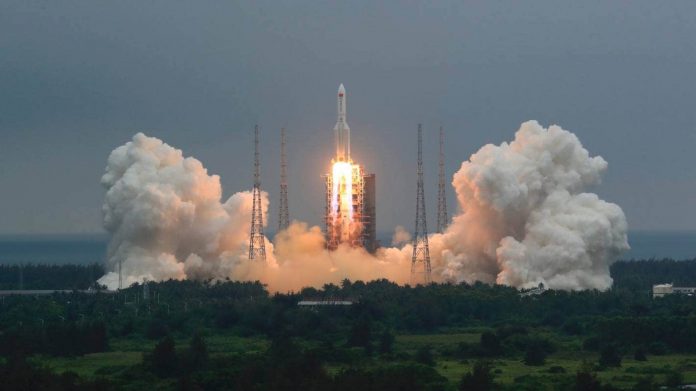Debris from an out-of-control Chinese rocket has broken through Earth’s atmosphere over the Indian Ocean.
The Chinese National Space Agency confirmed the Long March 5B rocket re-entered over the Indian Ocean at 02.24 UTC (2.24pm New Zealand time) on Sunday, southwest of Sri Lanka.
The Aerospace Corporation also posted on Twitter saying the rocket was down, after earlier forecasts suggested the rocket would land in the ocean near the North Island.
Harvard astrophysicist Jonathan McDowell, who tracked the tumbling rocket part, said on Twitter: “An ocean reentry was always statistically the most likely. It appears China won its gamble… But it was still reckless”.
China’s official Xinhua News Agency said: “The vast majority of items were burned beyond recognition during the reentry process”.
Despite that, Nasa Administrator Senator Bill Nelson issued a statement saying: “It is clear that China is failing to meet responsible standards regarding their space debris.”
Usually, discarded rocket stages reenter the atmosphere soon after liftoff, normally over water, and don’t go into orbit.
The rocket was launched last week, carrying the first module of China’s space station into orbit.
The station module successfully entered its planned orbit, but the 30-metre, 21-tonne stage of the rocket was expected to make an uncontrolled re-entry.
Space-Track, reporting data collected by US Space Command, earlier estimated the debris would land in the North Atlantic Ocean, but said on Twitter that re-entry location estimates were largely uncertain.
The European Space Agency has predicted a potential “risk zone” that encompasses a huge swath of the globe – including “virtually all of the Americas south of New York, all of Africa and Australia, parts of Asia south of Japan and Europe’s Spain, Portugal, Italy and Greece.”
The projections were highly uncertain. It is difficult to predict where or when the debris will hit the Earth, and variations of just a few minutes could change the re-entry point by thousands of kilometres.
Much of the rocket section is likely to burn up in the intense heat created as it enters the Earth’s atmosphere, but given the size of the segment, some debris could make it to the ground.
While any debris that does make it through will most likely fall into the ocean or onto areas of uninhabited land, it was predicted that some could fall over inhabited areas.
Experts were earlier urging people not to panic. McDowell told Space.com the typical risk of an individual being hit was “one in many billions”.







